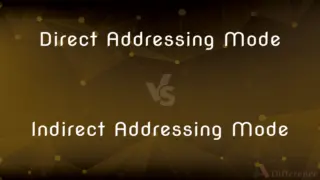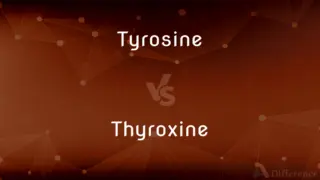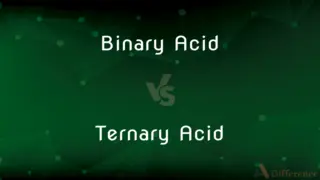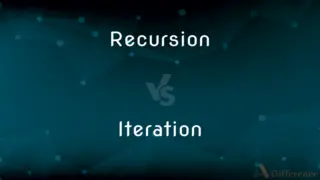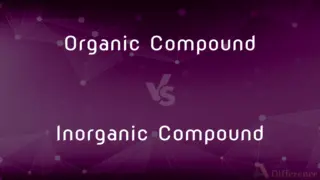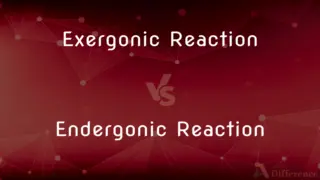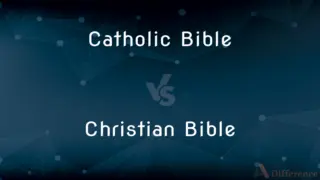Miniscule vs. Minute — What's the Difference?
By Tayyaba Rehman & Fiza Rafique — Updated on April 8, 2024
Minuscule refers to extremely small in size or amount, while minute emphasizes time, being sixty seconds or a precise moment, and can also mean very small.

Difference Between Miniscule and Minute
Table of Contents
ADVERTISEMENT
Key Differences
Minuscule is used to describe something that is very small in size, amount, or degree, often in a way that implies it is too small to be significant or easily seen. On the other hand, minute has a primary meaning related to time, representing sixty seconds or a specific moment, but it can also be used to describe something extremely small or detailed, similar to minuscule but often implying even finer details.
When discussing typography, "minuscule" refers to lowercase letters, highlighting their smaller size compared to uppercase letters. Conversely, "minute" does not have a specific typography application but maintains its focus on small measurements or details, whether in time or size.
In scientific contexts, minuscule might describe microscopic particles or quantities that are difficult to detect without specialized equipment. Meanwhile, minute could be used to describe tiny organisms or cellular structures, emphasizing their size or the meticulous detail needed for their study, as well as short periods of time crucial for certain reactions or processes.
Minuscule often carries a connotation of being insignificantly small, which might affect the perceived importance or impact of what it describes. In contrast, minute, when used to describe size, suggests something is small but might still hold significant detail or importance, particularly in contexts requiring precision.
Both terms highlight smallness but from different perspectives: minuscule focuses more on the physical size or amount, often diminishing the subject's perceived value, while minute can indicate both tiny size and short spans of time, frequently emphasizing detail and precision without necessarily reducing importance.
ADVERTISEMENT
Comparison Chart
Primary Meaning
Extremely small in size or amount
Sixty seconds; a very small or precise part of time
Secondary Meaning
Lowercase letters in typography
Extremely small in size or detailed
Contexts Used
General description, typography
Time measurement, detailed descriptions
Connotation
Insignificantly small
Detailed, precise, can be critically small
Examples
Particles, font sizes, minor details
Moments, microscopic details, precise measurements
Compare with Definitions
Miniscule
Extremely small in size.
The minuscule text on the contract required a magnifying glass to read.
Minute
Sixty seconds or a specific moment in time.
He said he would be back in a minute.
Miniscule
Hardly detectable.
There was only a minuscule amount of bacteria present in the sample.
Minute
Insignificant in duration.
The delay was only a minute, but it caused much anxiety.
Miniscule
Very minor or slight.
The adjustment made to the machine was minuscule but crucial.
Minute
Extremely small in size or detail.
The artist's work is known for its minute details.
Miniscule
Lowercase letters in writing.
Medieval manuscripts show a variety of minuscule scripts.
Minute
Precise or detailed in nature.
The scientist made minute observations of the specimen.
Miniscule
Insignificant in amount.
The budget allocated to the project was minuscule.
Minute
Very careful or meticulous.
The plan was executed with minute precision.
Miniscule
Variant of minuscule.
Minute
A unit of time equal to one sixtieth of an hour, or 60 seconds.
Miniscule
Alternative spelling of minuscule
Minute
A unit of angular measurement equal to one sixtieth of a degree, or 60 seconds. Also called arcminute, minute of arc.
Miniscule
Very small;
A minuscule kitchen
A minuscule amount of rain fell
Minute
A measure of the distance one can cover in a minute
Lives ten minutes from school.
Minute
A short interval of time; moment.
Minute
A specific point in time
Stop that this minute!.
Minute
A note or summary covering points to be remembered; a memorandum.
Minute
Minutes An official record of the proceedings of a meeting.
Minute
To record in a memorandum or the minutes of a meeting.
Minute
Exceptionally small; tiny.
Minute
Not worthy of notice; insignificant
A minute problem.
Minute
Characterized by careful scrutiny and close examination
Held a minute inspection of the grounds.
Minute
A unit of time equal to sixty seconds (one-sixtieth of an hour).
You have twenty minutes to complete the test.
Minute
(informal) A short but unspecified time period.
Wait a minute, I’m not ready yet!
Minute
A unit of angle equal to one-sixtieth of a degree.
We need to be sure these maps are accurate to within one minute of arc.
Minute
A (usually formal) written record of a meeting or a part of a meeting.
Let’s look at the minutes of last week’s meeting.
Minute
A unit of purchase on a telephone or other similar network, especially a cell phone network, roughly equivalent in gross form to sixty seconds' use of the network.
If you buy this model, you’ll get 100 free minutes.
Minute
A point in time; a moment.
Minute
A nautical or a geographic mile.
Minute
An old coin, a half farthing.
Minute
(obsolete) A very small part of anything, or anything very small; a jot; a whit.
Minute
(architecture) A fixed part of a module.
Minute
A while or a long unspecified period of time
Oh, I ain't heard that song in a minute!
Minute
(transitive) Of an event, to write in a memo or the minutes of a meeting.
I’ll minute this evening’s meeting.
Minute
To set down a short sketch or note of; to jot down; to make a minute or a brief summary of.
Minute
Very small.
They found only minute quantities of chemical residue on his clothing.
Minute
Very careful and exact, giving small details.
The lawyer gave the witness a minute examination.
Minute
The sixtieth part of an hour; sixty seconds. (Abbrev. m. or min.; as, 4 h. 30 m.
Four minutes, that is to say, minutes of an hour.
Minute
The sixtieth part of a degree; sixty seconds (Marked thus (´); as, 10° 20´).
Minute
A nautical or a geographic mile.
Minute
A coin; a half farthing.
Minute
A very small part of anything, or anything very small; a jot; a tittle.
Minutes and circumstances of his passion.
Minute
A point of time; a moment.
I go this minute to attend the king.
Minute
The memorandum; a record; a note to preserve the memory of anything; as, to take minutes of a contract; to take minutes of a conversation or debate; to read the minutes of the last meeting.
Minute
A fixed part of a module. See Module.
Minute
Of or pertaining to a minute or minutes; occurring at or marking successive minutes.
Minute
Very small; little; tiny; fine; slight; slender; inconsiderable; as, minute details.
Minute
Attentive to small things; paying attention to details; critical; particular; precise; as, a minute observer; minute observation.
Minute
To set down a short sketch or note of; to jot down; to make a minute or a brief summary of.
The Empress of Russia, with her own hand, minuted an edict for universal tolerance.
Minute
A unit of time equal to 60 seconds or 1/60th of an hour;
He ran a 4 minute mile
Minute
An indefinitely short time;
Wait just a moment
It only takes a minute
In just a bit
Minute
A particular point in time;
The moment he arrived the party began
Minute
A unit of angular distance equal to a 60th of a degree
Minute
A short note;
The secretary keeps the minutes of the meeting
Minute
Distance measured by the time taken to cover it;
We live an hour from the airport
Its just 10 minutes away
Minute
Infinitely or immeasurably small;
Two minute whiplike threads of protoplasm
Reduced to a microscopic scale
Minute
Immeasurably small
Minute
Characterized by painstaking care and detailed examination;
A minute inspection of the grounds
A narrow scrutiny
An exact and minute report
Common Curiosities
Is minuscule negative in connotation?
Minuscule can carry a connotation of insignificance, suggesting something is too small to be of importance.
Can minute refer to something other than time?
Yes, minute can also describe something extremely small in size or detailed.
Can both terms be used interchangeably when describing size?
While both can describe small size, minute often implies greater detail or precision, making them not always interchangeable.
What is the main difference between minuscule and minute?
Minuscule primarily describes something very small in size or amount, whereas minute refers to a period of sixty seconds or something very small or detailed.
How does typography use the term minuscule?
In typography, minuscule refers to lowercase letters, emphasizing their smaller size compared to uppercase letters.
Do minuscule and minute have synonyms?
Yes, both have synonyms related to smallness, but their precise meanings and contexts of use may vary.
Why might someone choose to use the word minute?
Someone might use "minute" to emphasize the smallness or preciseness of details, or to specify a short time duration.
Is there a historical reason for the dual meaning of minute?
The dual meaning of "minute" reflects its Latin origin, which includes meanings related to smallness and division of hours.
How are minuscule and minute used in scientific contexts?
Minuscule is used to describe very small quantities or sizes, while minute can describe tiny details or short periods crucial for scientific observations.
Can minute details be considered important?
Yes, minute details can be critically important, especially in contexts requiring precision and meticulous observation.
How does the use of minuscule and minute vary in literature?
In literature, minuscule might describe tiny elements of a setting, while minute could describe detailed descriptions or brief moments in time.
How do perceptions of minuscule and minute differ?
Minuscule is often perceived as insignificantly small, while minute can suggest significant detail or precision despite small size.
What makes a detail minuscule?
A detail is considered minuscule if it is extremely small or minor to the point of being negligible or difficult to notice.
Can the significance of something minuscule be underestimated?
Yes, something described as minuscule can have its significance underestimated due to its small size or perceived insignificance.
Why is precision important in the use of the term minute?
Precision is important in the use of "minute" because it often relates to detailed observations or measurements where accuracy is critical.
Share Your Discovery

Previous Comparison
Obsession vs. Infatuation
Next Comparison
Savory vs. UmamiAuthor Spotlight
Written by
Tayyaba RehmanTayyaba Rehman is a distinguished writer, currently serving as a primary contributor to askdifference.com. As a researcher in semantics and etymology, Tayyaba's passion for the complexity of languages and their distinctions has found a perfect home on the platform. Tayyaba delves into the intricacies of language, distinguishing between commonly confused words and phrases, thereby providing clarity for readers worldwide.
Co-written by
Fiza RafiqueFiza Rafique is a skilled content writer at AskDifference.com, where she meticulously refines and enhances written pieces. Drawing from her vast editorial expertise, Fiza ensures clarity, accuracy, and precision in every article. Passionate about language, she continually seeks to elevate the quality of content for readers worldwide.















